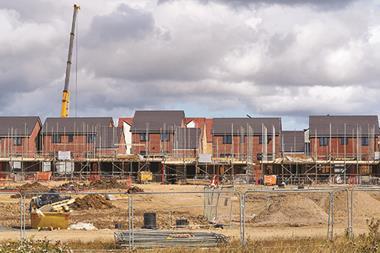The government’s recently announced Accelerated Construction Scheme, which aims to speed up the delivery of new homes by underwriting construction risks, has been generally well received by the sector.

The Homes and Communities Agency, which is administering the scheme, hopes housebuilders will be emboldened by the safety net now in place and seek to deliver larger developments in one go rather than smaller sites in stages.
Such action and recognition by the government of the risks managed by developers is welcome but it remains only part of the solution.
We are keen that ministers continue to consider ways of supporting the industry in tackling Britain’s housing crisis of course, but we also believe in being proactive about ways of building homes.
Many housing providers working in tandem with privately-owned developers have the balance sheet strength to support large-scale development in a single push because they have the funds lined up already.

Joint ventures such as our White Rock and Boorley Green partnerships with Galliford Try are able to spread the risk by the pooling of resources, allowing bigger schemes to get off the ground quicker. The joint venture approach also allows partners to respond to market conditions, stepping up build rates when demand is high.
Most housing associations usually cross paths with developers when purchasing their section 106 requirements. This delivers affordable homes but can, without early collaboration, come at the expense of proper placemaking.

Successful, cohesive communities that make commercially viable developments can be built when like-minded housebuilders and housing providers collaborate from the outset.
Multiple tenures needed
Joint ventures also offer the opportunity to bring forward more units under different models such as shared ownership. Solving the housing crisis and supporting the aspirations of people to own property needs more than just homes for open market sale or affordable rent. We recognise this at Aster, which is why we plan to ensure shared ownership makes up a significant chunk of the 9,500 homes in our pipeline over the next seven years.
White Rock and Boorley Green are not unique, thankfully. Their success has relied on the progressive and commercially-focused cultures of both organisations.
Creating more partnerships such as these could have a transformative effect on the UK’s housing crisis. But not every housing provider and housebuilder will make a good match.
Call Off Duty to counter the housing crisis
If you agree that the government should reform SDLT, support Property Week’s campaign to Call Off Duty by completing our short survey here or tweeting us @propertyweek using #CallOffDuty and telling us what you want. In the new year, we will present your demands to the chancellor.
Providers will need a development-orientated outlook, an agile executive team and a track record in delivery as well as capital ringfenced for building, and housebuilders will need a longer-term outlook and understanding of the dynamics of affordable housing.
The good news is that present conditions support more collaboration. The advent of Right to Buy for socially rented homes will push providers to explore more options for new development and clearly, housebuilders are trying to de-risk schemes.
Initiatives such the Accelerated Construction Scheme are positive for the sector. The UK’s housing shortage affects everybody, so it is right that the government recognises development as a priority. We need to do our bit too. By working together, housing providers and developers can also share risk and create a flexible, innovative approach to housebuilding.
Amanda Williams is group development director at Aster Group





























No comments yet